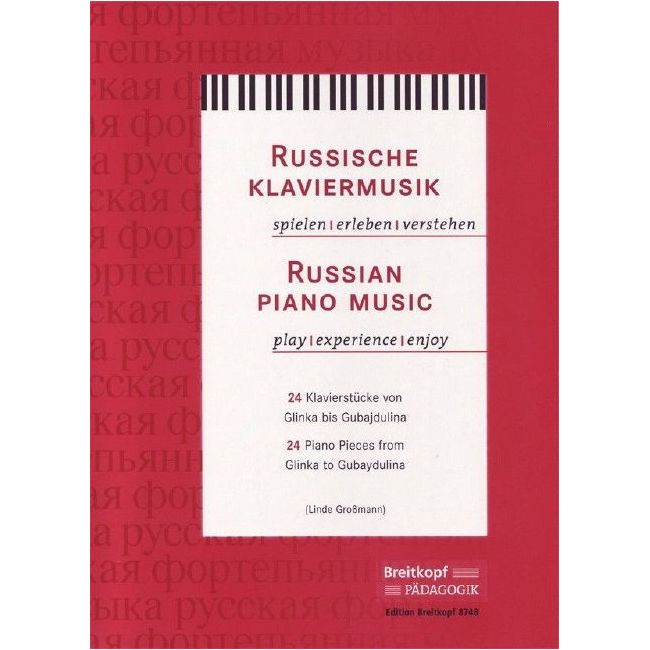| Pages | 88 |
|---|
| ISMN | 9790004181782 (M004181782) |
|---|
Neues und Bewährtes aus dem Klavierland Russland Glinka und Gubajdulina – ein schöner Stabreim – stehen als chronologische Eckpfeiler auf dem Umschlag, dazwischen aber ergeben in „Russischer Klaviermusik“ bekannte Komponisten (wie Mussorgskij, Rimskij-Korsakow, Glasunow, Skrjabin, Kabalewskij, Schostakowitsch) und echte Entdeckungen (wie Gawrilin, Kossenko, Mylnikow) eine gut abgestimmte Mischung. Das traditionelle Klavierland Russland wird facettenreich vorgestellt. Doch nicht nur die Auswahl überzeugt beim näheren Hinsehen, auch der Untertitel „Spielen – Erleben – Verstehen“ hält, was er verspricht. Die bekannte Klavierpädagogin Linde Großmann liefert zu den 24 leichten bis mittelschweren Stücken einen ausführlichen Kommentar unter verschiedenen klavierpädagogischen Aspekten.Zum Notenbeispiel Glasunow, MiniatureEine Besonderheit dieses charmanten Stückchens besteht darin, dass es zwar am Anfang, zu Beginn der Reprise und am Ende (befestigt noch durch einen viertaktigen Orgelpunkt) nach C-dur kadenziert, sonst aber in der Schwebe lässt, ob es nicht vielleicht doch in der Paralleltonart a-moll steht. Durch solche Zweideutigkeit und die Vermeidung klarer Kadenzen im Verlauf des Stückes wirkt die Musik trotz der überwiegend durchgehaltenen Gliederung in Viertaktgruppen sehr zusammenhängend. Es drängt sich die Vermutung auf, dass diese weiträumige Planung eine Folge von Glasunows Erfahrungen im Bereich großer symphonischer Werke ist, die sich eben auch im kleinen Maßstab niederschlagen. Der kapriziöse Charakter des vorliegenden Stückes wird auch durch die Transparenz des Klaviersatzes und eine an die Mazurka erinnernde Rhythmik unterstrichen (häufige Punktierungen auf dem ersten Viertel und gedehnte und betonte dritte Viertel im Takt).Die zahlreichen arpeggierten Akkorde bewahren den Klang vor zu großer Kompaktheit. Der Spieler sollte Druck aus dem Arm vermeiden und stattdessen an ein schnelles Ablösen der Finger denken. In der Reprise wird die Leichtigkeit noch gesteigert durch die Begleitung mit Staccato-Achteln, das Pedal bleibt aber davon unberührt.


